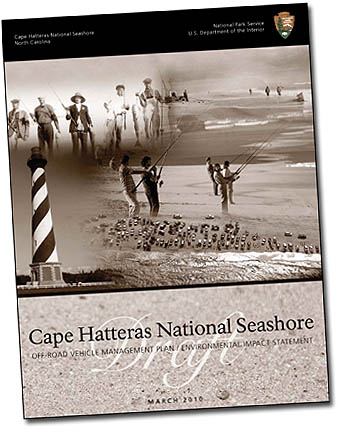The National Park Service has turned down a request by three North Carolina members of Congress to extend the public comment on the Draft Environmental Impact Statement on its off-road vehicle management plan.
U.S. Congressman Walter B. Jones, R-N.C., and Sens. Richard Burr, R-N.C., and Kay Hagan, D-N.C., asked National Park Service Director Jon Jarvis earlier this month for a 30-day extension of the public comment period on the Draft Environmental Impact Statement for the Cape Hatteras National Seashore Off-Road Vehicle Management Plan (DEIS).
In a letter to Jones dated April 29, David Vela, regional director of the Southeast Region of the National Park Service in Atlanta, turned down the request.
“Approximately 25 organizations, including the Dare County and Hyde County governments, that represent large constituencies interested in the ORV management issue were well represented and actively participated on the CAHA negotiated rulemaking advisory committee (committee) and related sub-committees and work groups that met numerous times between Jan. 3, 2008 and Feb. 26, 2009,” Vela wrote in his letter.
He also noted that five of the six alternatives analyzed in the DEIS are substantially the same as the five alternatives that NPS described to the committee and released to the public at a committee meeting on Nov. 14, 2008.
“The sixth alternative (F),” he wrote, “considered in the DEIS is based on the work of the committee, recognizing that the committee did not reach consensus on a recommended alternative.”
Vela said that, based on the history and current status of the process, “…we believe the current 60-day comment period fully meets the requirements of the National Environmental Policy Act and provides ample opportunity for public involvement and comment. We have decided not to extend the public comment period at this time.”
“This decision is quite unfortunate but not unexpected,” said John Couch, president of the Outer Banks Preservation Association. “It doesn’t serve the public’s need to understand the 810-page (Draft Environmental Impact Statement) document.”
U.S. Congressman Walter B. Jones, R-N.C., and Sens. Richard Burr, R-N.C., and Kay Hagan, D-N.C., have asked National Park Service Director Jon Jarvis for a 30-day extension of the public comment period on the Draft Environmental Impact Statement for the Cape Hatteras National Seashore Off-Road Vehicle Management Plan (DEIS).
The Park Service published the DEIS on March 5 and gave the public until May 11 – or 60 days – to comment on the 800-page document.
In a letter sent to Jarvis on Friday, April 16, Jones, Burr, and Hagan argued that an extension is necessary to provide the public with adequate time to thoroughly review and comment on the complex, lengthy document.
The text of the letter:
“Dear Director Jarvis:
We are writing to request a 30-day extension of the comment period on the Draft Environmental Impact Statement for the Cape Hatteras National Seashore Off-Road Vehicle Management Plan (DEIS). The National Park Service (NPS) published the DEIS in the Federal Register (75 Fed. Reg. 01307) on March 5, 2010, and gave the public until May 11, 2010 to submit comments.
The DEIS is a complex document that is over 800 pages long. It is also incredibly important – as NPS has stated, once finalized, the environmental impact statement “will form the basis for a special regulation, guiding the management and control of ORVs at the Seashore for the next 10 to 15 years.” Given these facts, the 60-day comment period provided by the Park Service does not provide sufficient time for the public to adequately review such a significant document.
We respectfully request that you extend the comment period by an additional 30 days to allow taxpayers the opportunity to fully participate in this process.”
The Park Service has been operating under a consent decree since April of 2008. The decree ended a lawsuit by environmental groups over the park’s lack of ORV regulations.
Under the terms of the consent decree, the Final Environmental Impact Statement is due in the fall. The ORV rule is to be finished by the end of the year and in place by the spring of next year.
Subject
Name
(required, will not be published)
(required, will not be published)
City :
State :
Your Comments:
May be posted on the Letters to the Editor page at the discretion of the editor.
May be posted on the Letters to the Editor page at the discretion of the editor.
May be posted on the Letters to the Editor page at the discretion of the editor.
May be posted on the Letters to the Editor page at the discretion of the editor.









